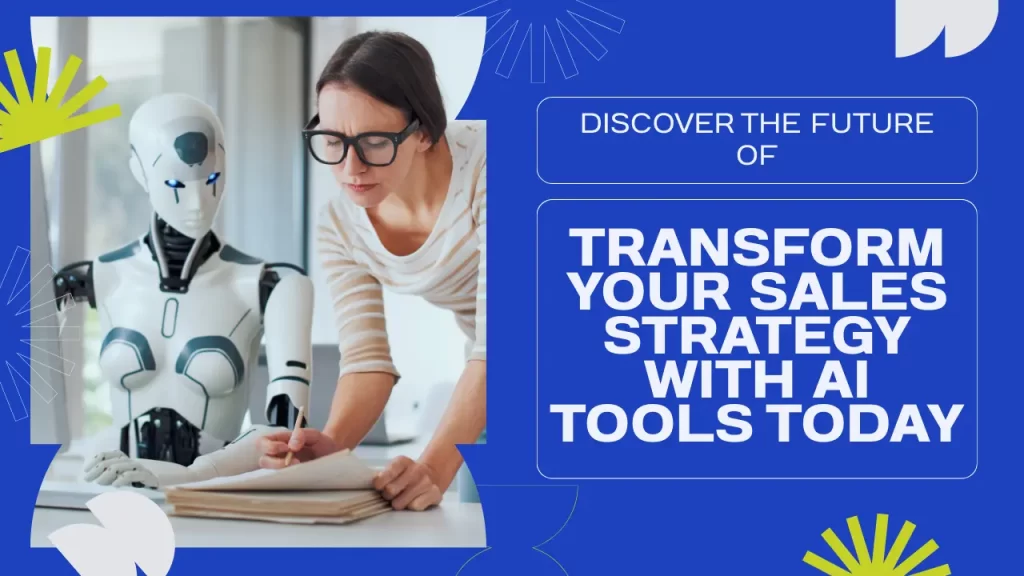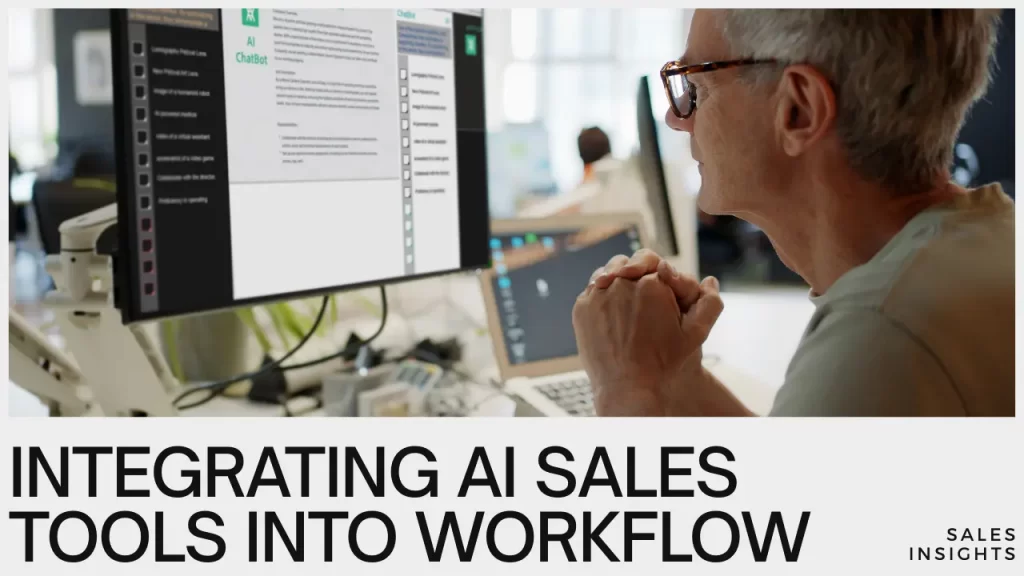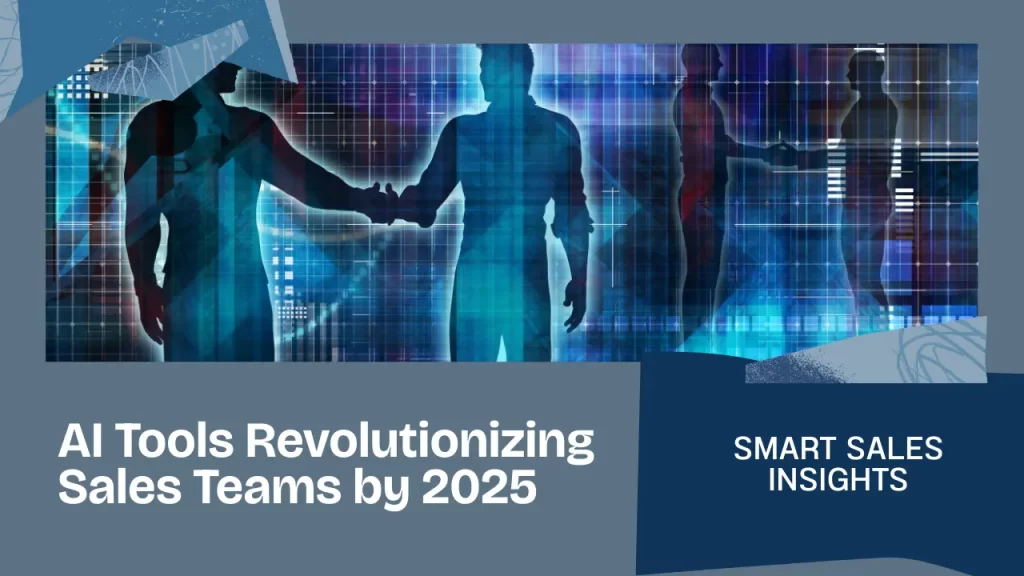Introduction: Why Sales Teams Are Turning to AI in 2025
Sales is no longer just about cold calling or following scripts. Today’s sales environment is data-driven, hyper-competitive, and fast-paced. Sales professionals juggle lead generation, CRM updates, personalized communication, and performance tracking—all while trying to close more deals.
That’s where AI tools for sales step in.
AI-powered platforms automate tedious tasks, offer predictive insights, and help sales reps focus on what truly matters: building relationships and converting leads.
This article will walk you through the top AI tools, their real-world applications, and how to pick the right one for your business in 2025.
Objective of This Guide
This article aims to:
- Explain what AI sales tools do
- Showcase the top-performing platforms
- Break down the benefits, use cases, and ROI
- Help you select the best AI tools for your sales strategy

What Are AI Tools for Sales?
AI tools for sales use machine learning, natural language processing (NLP), and predictive analytics to automate and enhance various stages of the sales process, including:
- Lead scoring and qualification
- Email personalization
- Pipeline forecasting
- Sales enablement
- Performance tracking
- Chatbot-based lead engagement
These tools act as digital assistants—handling repetitive work while offering real-time data insights to help sales teams convert faster and more efficiently.
Best AI Tools for Sales in 2025
Here are the most powerful and widely-used AI sales tools in 2025, covering various functions:
1. Gong.io
- Purpose: AI-driven conversation intelligence
- Best for: Sales managers, coaches, and teams
-
Features:
- Records and analyzes sales calls
- Provides insights on talk ratio, objections, competitor mentions
- Suggests winning sales behaviors
Gong helps sales reps improve call performance while giving managers a 360-degree view of what works and what doesn’t.
2. HubSpot Sales Hub (AI-Powered CRM)
- Purpose: All-in-one CRM with AI integration
- Best for: Small to mid-sized businesses
-
Features:
- AI email content assistant
- Predictive lead scoring
- Chatbot builder
- Deal prediction
HubSpot’s AI tools automate outreach, identify hot leads, and provide insights to close more deals.
3. Clari
- Purpose: Revenue forecasting and pipeline analytics
- Best for: Enterprise sales leaders
-
Features:
- Predictive revenue forecasting
- Pipeline visibility and health checks
- AI-based risk detection in deals
Clari ensures you always know what’s in your pipeline and what needs attention before deals slip through the cracks.
4. Drift
- Purpose: Conversational marketing and sales
- Best for: B2B SaaS and enterprise sales
-
Features:
- AI-powered chatbots
- Real-time visitor targeting
- Qualification and routing
Drift’s chatbots engage with site visitors, qualify leads, and route them to human reps instantly—boosting conversion rates dramatically.
5. People.ai
- Purpose: Sales performance and productivity tracking
- Best for: Data-driven sales teams
-
Features:
- AI auto-logging of sales activities
- Insights into rep performance
- Deal engagement scoring
People.ai removes the burden of manual logging while delivering rich analytics to help reps stay focused and managers make better decisions.

How AI Optimizes Each Stage of the Sales Funnel
| Stage | AI Features | Tools |
|---|---|---|
| Lead Generation | Predictive targeting, behavior analysis | Drift, 6sense |
| Lead Qualification | Scoring, segmentation, CRM enrichment | HubSpot, Salesforce AI |
| Outreach | Email personalization, send-time optimization | Lavender, Copy.ai |
| Engagement | Chatbots, follow-up automation | Drift, Exceed.ai |
| Closing | Sentiment analysis, real-time objection handling | Gong, Chorus |
| Post-Sale | Churn prediction, upsell targeting | Clari, People.ai |
Benefits of Using AI Tools in Sales
1. More Time for Selling
AI handles admin work like data entry, scheduling, and lead tracking, freeing up reps to spend more time selling.
2. Higher Close Rates
Tools like Gong and Clari help reps refine their pitch and timing—resulting in better deal outcomes.
3. Better Forecasting
AI tools analyze historical and real-time data to provide accurate sales forecasts, helping leaders make smarter decisions.
4. Improved Personalization
AI enhances email and messaging personalization by analyzing user behavior, interests, and preferences—leading to higher engagement rates.
5. Lower Cost of Sales
By automating lead gen and nurturing, AI reduces the resources needed to acquire customers.
Real-World Use Cases of AI Tools for Sales
B2B SaaS Company
A SaaS company uses Drift to engage web visitors with AI chatbots. Qualified leads are routed instantly to reps, reducing the sales cycle by 40%.
E-commerce Sales Team
A retail brand uses AI-powered CRM tools to personalize email sequences. Open rates jump by 25% and conversions increase by 18%.
Enterprise Sales
An enterprise firm implements Clari to clean its pipeline. The AI flags at-risk deals, leading to 5% higher quarterly closing rates.
AI Sales Tools vs Traditional Sales Software
| Feature | Traditional CRM | AI-Powered Sales Tools |
|---|---|---|
| Data Entry | Manual | Automated |
| Lead Scoring | Static rules | Predictive AI |
| Forecasting | Spreadsheet-based | Real-time, dynamic |
| Engagement | Manual outreach | AI chat + personalization |
| Efficiency | Labor-intensive | High automation |
How to Choose the Right AI Sales Tool
Ask the following before buying:
- What size is my sales team?
- Do I need analytics, outreach, or engagement tools?
- What CRM system do we currently use?
- Do I need real-time chat or just email automation?
- What’s my budget and technical skill level?
Start with a trial of 1-2 tools to see which fits best with your workflow.
Future of AI in Sales
The future is heading toward:
- AI sales coaching with real-time prompts
- Emotion detection in video calls
- Multilingual sales assistants
- Voice-to-Close AI platforms
- Sales intelligence that suggests entire pitch decks
AI will become less of an assistant and more of a co-pilot, helping sales teams hit quota faster with less friction.
How AI Is Reshaping the Sales Rep Role in 2025
The role of a sales representative has evolved dramatically in the age of artificial intelligence. No longer just about cold calls or simple CRM updates, modern sales reps are now data interpreters, strategic advisors, and customer experience champions—powered by intelligent tools.
AI eliminates repetitive tasks such as logging call data, updating deal status, and manually scoring leads. This allows sales reps to dedicate more time to strategic selling and relationship-building.
AI also provides real-time insights, such as buyer intent, optimal contact timing, and conversation quality analysis. These capabilities equip sales reps with a deeper understanding of customer needs and how to close deals faster.
Moreover, with AI-driven sales enablement platforms, reps receive training suggestions, personalized content prompts, and pitch feedback, turning every rep into a top performer. Instead of replacing sales reps, AI tools augment their performance, enabling them to make data-backed decisions and deliver value at every stage of the sales cycle.
Measuring the ROI of AI Sales Tools: Metrics That Matter
When investing in AI tools for sales, measuring the return on investment (ROI) is crucial. But unlike traditional tools, the impact of AI is multi-dimensional and often extends beyond immediate cost savings.
Key metrics to evaluate include:
- Lead-to-close conversion rate: AI scoring ensures only high-quality leads are pursued.
- Sales cycle length: Tools like Clari and Drift reduce time spent per deal.
- Rep productivity: Track how AI reduces admin tasks and increases outreach.
- Customer acquisition cost (CAC): AI improves targeting and reduces wasted ad spend.
- Revenue per rep: With predictive analytics and guided selling, reps close more with less effort.
Some companies report ROI as high as 300% from AI-driven automation and insights. The key is to set baseline benchmarks before implementation and use analytics dashboards to track progress monthly or quarterly. A properly deployed AI system will not only increase sales but also reduce overhead, improve forecasts, and align marketing and sales.

Integrating AI Sales Tools into Your Existing Workflow
Adopting AI tools is not just about buying software—it’s about seamless integration into your existing sales workflow. Without proper implementation, even the best tools can underperform.
Here’s how to ensure smooth integration:
- CRM Compatibility: Ensure your AI tools sync with CRMs like Salesforce, HubSpot, or Zoho. Most top-tier tools offer native integrations or APIs.
- Team Training: Run onboarding sessions to teach sales reps how to interpret AI-generated insights and use them in their daily routine.
- Phased Rollout: Don’t try to adopt everything at once. Start with one or two functions (like email automation or forecasting), then expand as the team adapts.
- Cross-Department Alignment: Sales, marketing, and customer service should all be involved in the AI rollout to ensure consistent messaging and customer experience.
- Feedback Loop: Collect regular feedback from users to improve implementation. Many tools use AI to adjust based on how reps interact with them, creating a smarter workflow over time.
When properly integrated, AI sales tools don’t disrupt existing processes—they enhance them, bringing intelligence and automation to every stage of the sales funnel.
FAQs: AI Tools for Sales
Q1: Are AI sales tools only for large teams?
No. Many tools like HubSpot and Lavender are designed for solo sales reps or small teams, and offer scalable plans.
Q2: Can AI really predict who’s going to buy?
Yes. Predictive analytics use past buyer behavior, CRM data, and engagement patterns to highlight hot leads.
Q3: Do AI tools replace salespeople?
Not at all. AI enhances human capabilities by automating tasks and providing deeper insights—but relationship-building and negotiation still need human touch.
Q4: What skills do I need to use AI sales tools?
Most tools are designed to be user-friendly, often with drag-and-drop interfaces, tutorials, and CRM integrations. No coding required.
Q5: Is my data secure with AI tools?
Reputable platforms follow GDPR and SOC2 compliance standards. Always check a provider’s security page and privacy policy.
Conclusion: Is AI the Future of Sales?
Absolutely. AI tools for sales are more than just trendy—they’re essential in a world where speed, personalization, and insights determine success. Whether you’re a startup or an enterprise sales team, adopting AI can mean:
- Higher productivity
- Shorter sales cycles
- More closed deals
The time to leverage AI in your sales process is now.

